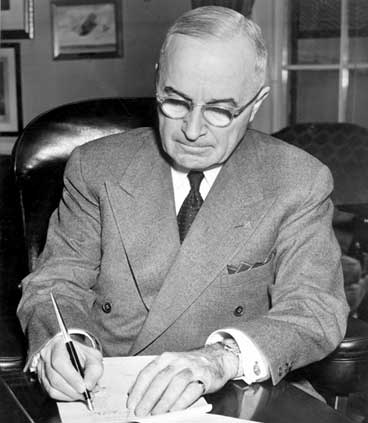The Cold War seems unreal now. But it seemed unreal in its own time, too.
It involved nearly every nation on earth, and used a bewildering array of weapons: economic warfare, diplomatic maneuvering, and endless propaganda. And though it was a “cold” war in the west, it frequently erupted into long, bloody conflicts in southeast Asia, Africa, and Central America.
Here in America, the Cold War became the real and daily threat of sudden nuclear annihilation for 42 years, which only ended in 1991 when the Soviet Union suddenly imploded.
There was no signing of a peace treaty because there had never really been a war. If the Cold War had a formal beginning, it was probably May 22, 1947. On this day, President Harry S. Truman signed into law what might be his most durable legacy: The Truman Doctrine.
At the time, the Soviet Union was actively fomenting revolution in the post-war world, and gambling that the United Nations were tired of fighting. Soviet forces had already seized control of much of eastern Europe, and begun walling off eastern Germany. It was also looking to expand into the Mediterranean, where governments were still staggering from the war.
Great Britain, financially drained from six years of war, was unable to continue its aid to democratic governments in Greece and Turkey. The United States feared these countries would fall to Russian domination without British help.
The Truman Doctrine launched America’s counter-offensive to the Soviets with a grant of $400 million in aid to stabilize the Turkish and Greek governments.
The Truman Doctrine committed America to containing communism. It was the opening of a broader initiative that eventually granted $17 billion to help war-torn Europe rebuild its economies and peoples.
The Post provided extensive coverage of these events and Americans’ attitudes about what their government’s initiatives. A short editorial article from the June 7, 1947 issue was titled “Most Americans Think the U.N. Worth Saving.” Addressing Americans’ attitude toward the appropriation of monies to Turkey and Greece, it says:
“They accept the necessity of sending food and extending military aid to Greece and Turkey, but they have a feeling that the scheme is too much like the establishment of a military bridgehead and too little like economic reconstruction.”
The American people were also extremely concerned that the money and aid were not going to fix the “root” of the problem. The problem at the time was perceived as:
“We have done too little to prevent Europe from rotting at the core – i.e., Germany – and, as a consequence, find ourselves trying desperately to patch her up around the edges.”
This latter statement was clearly referring to the Marshall Plan’s $17 billion in aid.
In “Why The Truman Doctrine Makes Sense,” appearing just a few weeks later, the editors state that the US had averted a disaster in the Mediterranean.
“State Department officials are certain that, if the United States had not acted promptly upon the announcement of British withdrawal, Greece would have been the victim of a coup d’etat within a few weeks.”
Later that month, the editors wondered about the proper recipients of aid under the Truman Doctrine in “Must We Lend Britain More Billions?”
“Our Truman Doctrine makes no sense at all if the United States is to pour hundreds of millions of dollars into puny countries like Greece and Turkey and Korea without simultaneously guaranteeing Britain against economic collapse.”
History has shown the wisdom of Truman’s plan. The United States pumped a fortune into Western Europe, but it stabilized global politics enough to ensure a 44 year stalemate.
It could be argued on a much larger scale that Truman’s foreign policy have led to America’s present-day involvement around the world.
It must have been unsettling to many Americans in 1947 to hear their governments was getting ready to commit billions upon billions of dollars in aid to ensure global peace, but it proved, ultimately, to be a good investment. And it might give us reason to be hopeful for peace beyond today’s terrorism.
Become a Saturday Evening Post member and enjoy unlimited access. Subscribe now




Comments
Jen Stewart, somewhat indirectly, brings this fact to the reader’s mind: Through the IMF, the United States is still being forced–whether the people like it or not–to bail out Greece and Turkey. Actually, we could have used that money, ourselves. America is a badly wounded giant.
Unlike the author, however, I do not believe our massive foreign aid, over lo those many years, was key–or, necessarily, even helpful–to the West’s winning of the so-called “Cold War.” More times than not, those monies and goods were wasted, misdirected or stolen–often, used against us. A strong case could be made that such a policy merely weakened the US, financially.
No, I think it was more the “Peace Through Strength” stance (including, of course, economic and spiritual strength) taken by many great American leaders–but most exemplified by President Ronald Reagan–that ultimately tipped that deadly game in our favor.
Though, of course, Russia remains a very real threat.
The Cold War was a power play.
Communistic U.S.S.R.
Wanting to party crash its way
In any nation, near and far.
The U.S. decided to buy
Some time to back democracy,
And gave billions to unify
Anti Soviet policy.
The super powers never warred
Face to face in a war gone hot.
They moved the pawns on their game board
Until the Soviets were not.
As old as man, war is as old.
If war must be, then serve it cold.